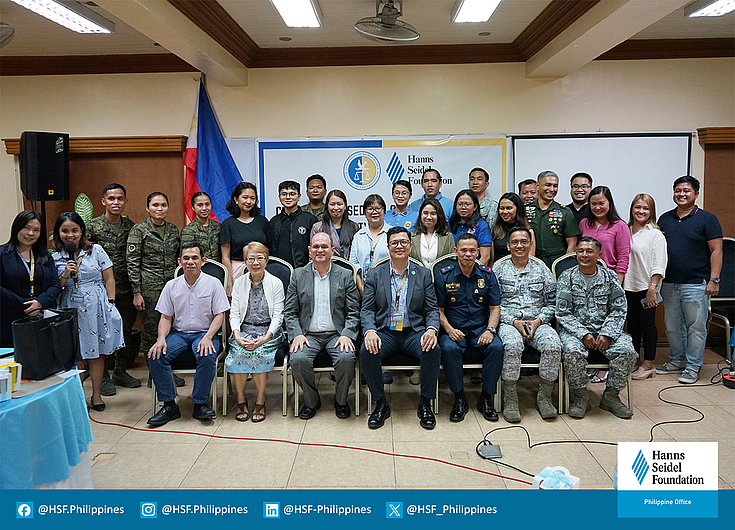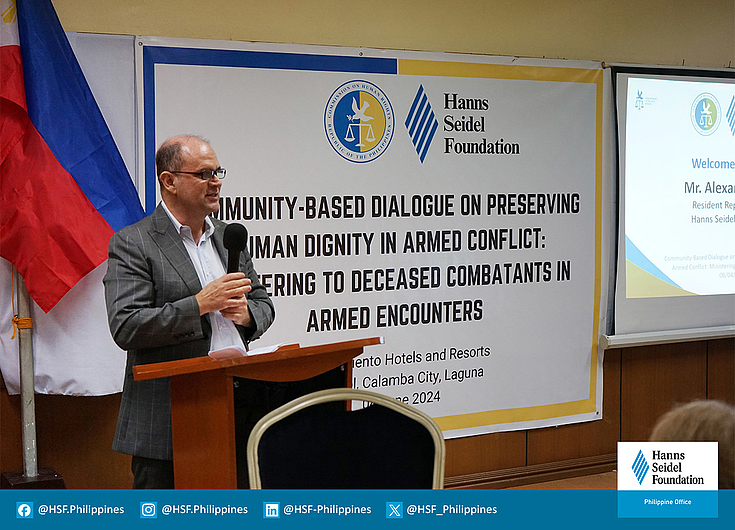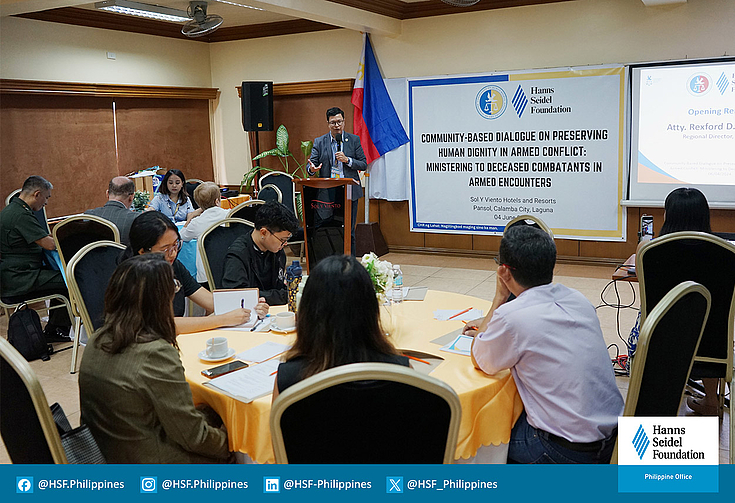Community-based Dialogues (CBD)
CBD on “Preserving Human Dignity in Armed Conflict: Ministering to Deceased Combatants”
HSF
The dialogue was conducted to discuss with and orient the stakeholders on the existing guidelines for the administration of human remains, particularly of combatants who perish in armed encounters; and to develop mutual agreements to implement the requirement to forthwith tender the remains of deceased combatants to their families. The CHR deemed it important with the seeming increase in recent years in cases involving the recovery of the remains of dead combatants, and suspects in some military and police operations.
The participants from the region comprised of AFP and PNP officers (from the Offices of the Law on Armed Conflict of the Philippine Air Force, and Civil Military Operations (CMO), 2nd Infantry Division of the Philippine Army; and Human Rights Office (HRO) and Forensic Unit, respectively); representatives from the Philippine Statistics Authority (PSA) and the Department of the Interior and Local Government (DILG); Civil Society Organizations (CSOs: IDEALS, Karapatan); Private/ Business Sector (owner of funeral home or mortuaries), and officers and staff of CHR IV-A led by its Regional Director, Atty. Rexford Guevarra. HSF was represented by its Resident Representative, Mr. Alexander Birle.
The Opening Remarks was given by CHR Regional Director, Atty. Rexford Guevarra. He acknowledged the CBD has been effective in reaching out to communities at the grassroots level, fostering strong relations between and among human rights stakeholders, and bridging gaps between the State and the citizens. He shared that the CHR‘ 16 regional offices conduct CBDs twice a year or 32 CBDs annually to discuss important and timely human rights issues. He thanked the participants for attending the activity to address the problem involving the recovery of the remains of dead combatants and suspects in some military or police operations. He expressed gratitude to HSF for its continued support for the promotion and protection of human rights.
HSF
HSF Resident Representative, Mr. Alexander Birle, gave the Welcome Message. He noted the long-standing partnership between the government and civil society to discuss and address human rights issues through the conduct of CBDs, especially at the local level. While he recognized the progress made in protecting human rights in the country, Mr. Birle admitted there are still challenges that require concerted efforts of everyone involved to achieve sustainable solutions. He stressed that over time, the cooperation will be sustained through mutual trust between and among the stakeholders. He enjoined everyone to take advantage of this opportunity to come together and develop good working relations towards building mutual trust.
The dialogue sessions covered a “Presentation of Cases on Refusal to Release Remains of Deceased Combatants, and the “Prevailing Laws and Guidelines on the Administration of Remains of Persons in Armed Encounters in the AFP and PNP.” Atty. R. Guevarra presented a summary of four cases since 2020, noting the CHR received complaints or allegations of such incidents or initiated ‘moto proprio’ investigation based on media reports. He cited the reason for refusal, evidence presented, and status. To date, the cadavers have been released to their families. The Assistant Chief of the Philippine Air Force’ Center for the Law on Armed Conflict (AFCLOAC), Lt. Col. Michael Macasaet, shared that based on the AFP guidelines, its personnel are required to turn over the remains of the deceased combatants to the PNP Scene of the Crime Operatives (SOCO) team as soon as possible. He added the AFP has no facility to accommodate storage of cadavers. On the part of the PNP, the Regional HRO chief, Police Major Edgar Sumadsad, showed a video presentation of their guidelines based on the PNP Operational Procedure Manual of 2021 (Investigation by the Local Police Unit after an Armed Confrontation) and PNP Memorandum Circular No. 2014-006 (Policy on Handling Cadavers for Investigation and Examination). He noted that once the cadaver is turned over to PNP SOCO, the investigator-on-case /medico-legal officer in cooperation with its Forensic Unit and Legal Officer will conduct the required procedures and then advise the funeral parlor (preferably duly accredited by the PNP) to release the cadaver to the family/relatives.
HSF
In the Open Forum, the participants were given the opportunity to ask questions, clarifications and share their insights and suggestions to the presentations. The Guide Questions served as basis for the discussions.
Atty. Diana Samaniego-Gamo, CHR IV-A Legal Division gave the Synthesis which highlighted the following: there is no hard and fast rule as far as the turnover of cadaver to the PNP-SOCO; PNP strictly adheres to primary evidence; and DILG allows secondary evidence for disaster-related victims.
She also delivered the Closing Remarks commending the conduct of the CBD with the participation of the security sector, government agencies and CSOs. She said the cooperation of the three sectors is an achievement in itself for the region. Atty. Gamo assured the participants the CHR Region IV-A will continue to reach out to the group in future discussions of human rights issues in the region. She thanked the participants for their invaluable contributions to the activity.
Plaques and Certificates of Participation were handed out to the resource persons and the rest of the participants, respectively. The activity was capped with a group photo.
Photo Gallery




